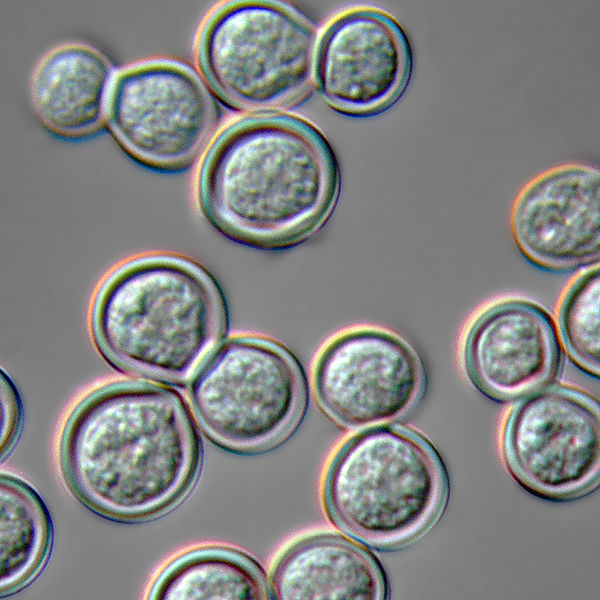Playlist
Show Playlist
Hide Playlist
Azoles – Antifungals
-
Slides Antifungals Antimicrobials.pdf
-
Download Lecture Overview
00:00 Take a look at this particular diagram. 00:03 We're going to start of with the azole antifungals. 00:06 The right down at the bottom here. 00:08 Now azole antifungals are often used in systemic infections. 00:12 And they have a variable oral bioavailability. 00:14 Some of them are actually intravenous only. 00:17 Now inducers of cytochrome P450 such as rifampin may actually decrease the bioavailability of some these agents. 00:28 So it is important to be aware that ketoconazole and other azole antifungals can be effected by inducers of cytochrome. 00:36 In terms of toxicity, common toxic reactions include vomiting, diarrhea, rash and heptatotoxicity. 00:44 Ketoconazole is a particularly bad drug for drug interaction and steroid blocking effects because it has lots of systemic effects as well as it's antifungal effect. 00:58 In terms of how these agents work, they inhibit ergosterol formation. 01:02 So ergosterol is going to be very important for the development of the cell wall within the fungal organisms. 01:09 It reduces the membrane permeability and it allows leakage of cations and nutrients out of the fungal cell. 01:18 Resistance is due to widespread use. 01:21 And we're starting to see it more and more. 01:23 It's usually because the susceptible enzymes that azoles act on, are either becoming reduced or changed. 01:32 Ketoconazole is considered a narrow spectrum antifungal. 01:36 More adverse events than other azoles. 01:39 So it's falling out of favor. 01:41 The patients that we use it on are usually patients who have chronic oral candidiasis. 01:47 And sometimes patients who have dermatological fungal infections. 01:51 I've mentioned to you before that it is a strong inhibitor of cytochrome P450. 01:57 And may increase the level of other drugs. 02:00 And inducers like rifampin may actually reduce ketoconazole levels. 02:05 Now a newer agent is fluconazole. 02:08 It's the drug of choice in most esophageal infections and oropharyngeal candidiasis. 02:13 A single oral dose often eliminates completely vaginal candidiasis. 02:19 Cryptococcal meningitis can also be treated with fluconazole, though it's typically reserved for consolidation and maintenance therapy after the initial combination of amphotericin and flucytosine. 02:30 In terms of other agents you can see them here, Canesten is the most well known azole antifungal. 02:38 Its generic name is clotrimazole. 02:41 It's a topical antifungal agent that works quite well topically or vaginally but it doesn't have a lot of use systemically. 02:49 It's often combined with a steroid like betamethasone used to treat Tinea corporis or Tinea cruris or Tinea pedis. 03:00 Itraconazole is a wide spectrum azole antifungal. 03:04 And it's often the drug of choice for infections like Blastomyces and Sporothrix schenckii. 03:11 It's the drug of choice for other types of infections as well. 03:15 Now it's an alternate drug of choice for aspergillosis, for coccidiomycoses, Cryptococcus and Histoplasma. 03:25 Voriconazole is a relatively new azole antifungal. 03:29 It has a slightly wider spectrum than the Itroconazole does. 03:32 And it may actually be better than amphotericin B. 03:35 I'm going to cover amphotericin B later. 03:39 Up to 30% of patients will develop visual blurring of unknown cause with this agent. 03:44 This is an important question, issued for you to know for questions because we often ask this particular question on exams. 03:54 Posaconazole is the broadest spectrum triazole out there. 03:59 It works against most species including Candida and Aspergillus. 04:05 It's the only azole with activity against Rhizopus and mucormycosis which may not be that commonly seen but it's something important to remember if you see a patient with mucor.
About the Lecture
The lecture Azoles – Antifungals by Pravin Shukle, MD is from the course Antimicrobial Pharmacology.
Included Quiz Questions
Which antifungal drug is associated with visual blurring of an unknown cause in up to 30% of patients?
- Voriconazole
- Posaconazole
- Clotrimazole
- Fluconazole
- Ketoconazole
What is a side effect associated with ketoconazole?
- Gynecomastia
- Chronic kidney disease
- Rhinorrhea
- Pneumonitis
- Thyrotoxicosis
What is the only azole with activity against Rhizopus infections (e.g., mucormycosis)?
- Posaconazole
- Variconazole
- Itraconazole
- Clotrimazole
- Fluconazole
Customer reviews
5,0 of 5 stars
| 5 Stars |
|
5 |
| 4 Stars |
|
0 |
| 3 Stars |
|
0 |
| 2 Stars |
|
0 |
| 1 Star |
|
0 |





